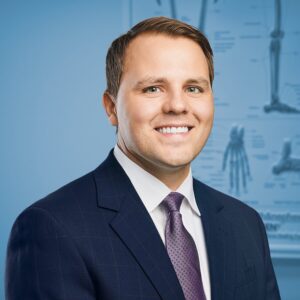By Dr. Greg Kolovich, orthopedic and peripheral nerve surgeon
Life is unpredictable. A regular day at work can turn into a life-altering event. Chris, a father of four in Georgia, knows this all too well.
Chris works at a pulp mill where he oversees the factory’s equipment. When he was working on a machine that wasn’t functioning properly, his hand was caught—and he lost his arm.
The aftermath of the accident was a series of surgeries and an onslaught of unbearable pain and narcotics.
 “Once I got home from the hospital, I started experiencing excruciating pain. I would cry myself to sleep—if I could sleep,” Chris explained to me. “I went to pain management, and it was helpful, but the pain was always there. It felt like a bolt of lightning was striking at the top of my arm and shooting down it—an arm I didn’t have. Other times, it felt like my arm was on fire or being crushed.”
“Once I got home from the hospital, I started experiencing excruciating pain. I would cry myself to sleep—if I could sleep,” Chris explained to me. “I went to pain management, and it was helpful, but the pain was always there. It felt like a bolt of lightning was striking at the top of my arm and shooting down it—an arm I didn’t have. Other times, it felt like my arm was on fire or being crushed.”
Chris was experiencing a condition affecting 50-85% of amputees: phantom limb pain. Prescription pain medication helped, but Chris was determined not to rely on narcotics for the rest of his life.
“I was terrified to be on pain medication because I know what narcotics can do to people. They can ruin lives, and I didn’t want that for me or my family,” Chris said.
In his mission to get off pain medication, Chris learned about surgical nerve repair and came to see me, a peripheral nerve surgeon.
When Chris first came in, he was on high-dose narcotics and was restless, flushed, and sweating. The way he described his pain—bolts of lightning, burning, crushing, sharp shooting pain—are all classic signs of neuropathic pain, which is common after a traumatic injury. Nerve pain can present in different ways, as well. People often describe tingling, numbness, “pins and needles,” sharp spasms, electric shocks, or extreme sensitivity to cold or heat. The pain can be constant or intermittent.
I talked to Chris about what was going on with his nerves and how they were malfunctioning. I explained that nerves are like an electrical wiring system that sends messages between the brain and the body. When nerves are damaged, they can form painful neuromas—masses of scar tissue in the nerve that are essentially a collection of ungrounded nerve endings.
 I recommended a nerve repair procedure called Targeted Muscle Reinnervation (TMR). I first removed four neuromas, which were the sources of Chris’ pain. I then repaired and reconstructed the nerves by connecting them to nerves located in Chris’ chest muscle. To make this possible, large gaps between the nerves had to be bridged, so donated nerve allografts were used to connect the nerves, allowing them to regenerate over time and restore more normal signals to the brain.
I recommended a nerve repair procedure called Targeted Muscle Reinnervation (TMR). I first removed four neuromas, which were the sources of Chris’ pain. I then repaired and reconstructed the nerves by connecting them to nerves located in Chris’ chest muscle. To make this possible, large gaps between the nerves had to be bridged, so donated nerve allografts were used to connect the nerves, allowing them to regenerate over time and restore more normal signals to the brain.
In the initial weeks after surgery, Chris was still on his pain medication regimen, but six weeks later, he was fully off all narcotics and able to resume his normal activities.
Chris shared what it meant to get his life back: “After the nerve surgery, I was able to get back to spending time with my wife, kids, and friends. I could go back to work with no restrictions, coach my daughter’s softball team—I could live a full life.”
Stories like Chris’ are why I do what I do. Nobody should have to sit on the sidelines of life, debilitated by pain or in a haze of narcotics. If you believe you or someone you know is suffering from phantom limb pain, encourage them to find a peripheral nerve surgeon for a consultation. We now have access to a variety of contemporary surgical nerve repair solutions that can help us eliminate pain and change lives.

Dr. Gregory Kolovich is an orthopedic and peripheral nerve surgeon at Optim Orthopedics in Savannah, Ga.
If you’re experiencing ongoing or chronic pain for three months or more following your amputation, it’s possible nerve damage is to blame. Seeking a consultation with a surgeon who specializes in nerve surgery may be a good next step. Consider asking your care team the following questions:
- If medication and/or physical therapy aren’t helping my pain, what’s the next step? Are there any specialists who can help me with this?
- Is it possible that nerve damage or a neuroma has formed and is causing my pain?
- Would it be helpful for me to consult with a peripheral nerve surgeon or specialist?

